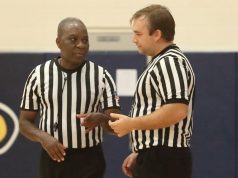Coaches and officials can have an adversarial relationship because of the primary difference between official’s and a coach’s mentality: Coaches care who wins and officials don’t. Because coaches are “pulling for” their team, devising offensive and defensive strategies, plus keeping a keen eye on their individual players, they see the game through vision with a built-in bias. They want things to go their way and they want events to roll in their favor.
A coach spends his entire life thinking he’s fighting off alligators. A referee is just another alligator.”
— Jack Pardee, former Houston Oilers football coach
As a consequence, they sometimes view officials’ decisions as unfair. Also, at times their zeal leads them to take an adversarial stance in regard to officials. They feel they have to fight the officials as well as their opponents. In rare instances, some coaches even view their roles as a contriver and antagonist in relation to officials. They may howl, whine and plead in an effort to gain a presumed edge or favorable treatment from officials. A few coaches will purposely behave in a way which irritates officials, apparently believing that such antics will somehow work to their advantage.
Some coaches believe that officials are influenced by their own expectations. That is, if a team has a reputation for superior play and if that team has a lopsided winning record, it may receive “soft” or tolerant treatment by officials because their own minds have been programmed to expect a top-flight performance. Conversely, if a team’s reputation (or coach’s, too) is such that officials anticipate sloppy or dirty play, plus either a lackadaisical or belligerent attitude, then officials may respond in a way that presumes such a reputation to be manifest. “Expect trouble and you get trouble,” one saying holds.
That attitude also perpetuates an “us versus them” mentality. You will often hear coaches use phrases like, “We don’t get the calls,” as if officials dole them out in biased fashion.
A main contention with some coaches is that officials aren’t accountable. Coaches get fired if they don’t win. They see officials as having no one to answer to when, in their mind, a call is blown. That is a typical lament from a frustrated coach: “If I foul up, I could lose my job. If an official goofs, the league says they’re sorry and the official keeps the job. Sanctions and reprimands should result from bad calls.” Those who complain in that fashion generally don’t have an understanding of the officiating process because there are checks and balances within officiating. Officials sometimes are subject to dismissal, dropped from leagues due to perceived shortcomings.
Another common complaint: Officials don’t care as much because they are part-time. Coaches sometimes view officials as “weekend warriors” who really don’t care. Most officials do indeed have full-time jobs and officiating is an avocation. The same is true for most coaches (except at the highest collegiate and professional levels). Some coaches “work the officials,” as indicated. They try to gain an advantage any way they can to win, including intimidating or begging officials in hopes the next call goes in their favor.
Some coaches consider themselves astute manipulators, and every phrase uttered to an official, before and during a contest, has a calculated purpose. Frankly, their efforts are sometimes successful, because humans are prone to be influenced by propaganda and flattery. Watch how TV commercials and print ads act as sales devices. Many coaches have adopted the same persuasive techniques and are effective salespersons. Some consider “selling” to be a central feature of their jobs, which it assuredly is, at least as far as players are concerned.
Whether their psychological tactics work or not, coaches perceive them to work, meaning officials must deal with it. When coaches yell about a particular call, they almost invariably know the official is not going to change that call. They may think, however, that by making a scene about that call, the official might be sympathetic and look at the next call a bit more in favor of that team. They think mentally planting those seeds in an official’s head works to their advantage later on.
Coaches often want things to be even because they think the other team is getting an advantage from the officials. That’s a part of the “us versus them” mentality. From an official’s perspective, when coaches beg for refs to call it both ways, what they’re really begging for is an advantage. They’re not interested in equality; they’re interested in an official’s performance tilted in their favor.
Trying to understand how many coaches approach their job may help you deal with delicate situations better. Understanding gives us context. However, that doesn’t excuse their behavior. You can still dole out penalties; now you just may understand a little bit better why they earned that penalty.
What's Your Call? Leave a Comment:
Note: This article is archival in nature. Rules, interpretations, mechanics, philosophies and other information may or may not be correct for the current year.
This article is the copyright of ©Referee Enterprises, Inc., and may not be republished in whole or in part online, in print or in any capacity without expressed written permission from Referee. The article is made available for educational use by individuals.
















